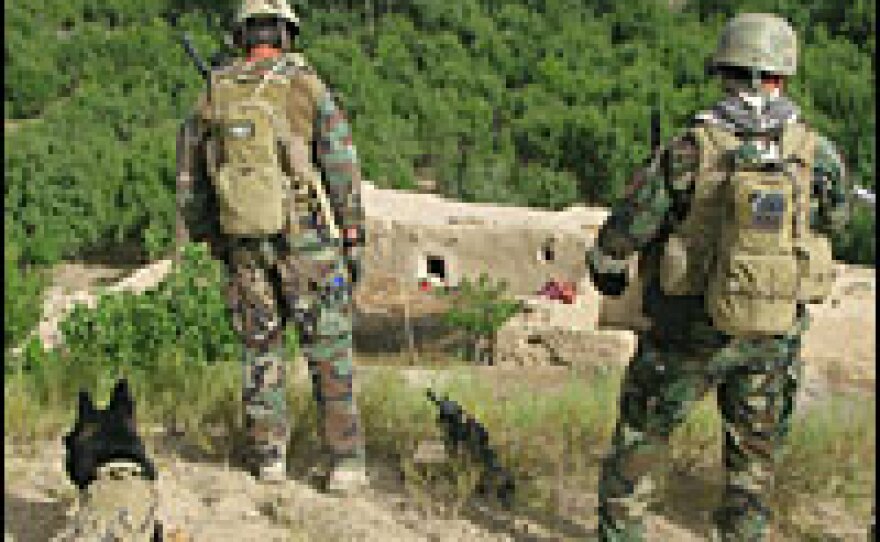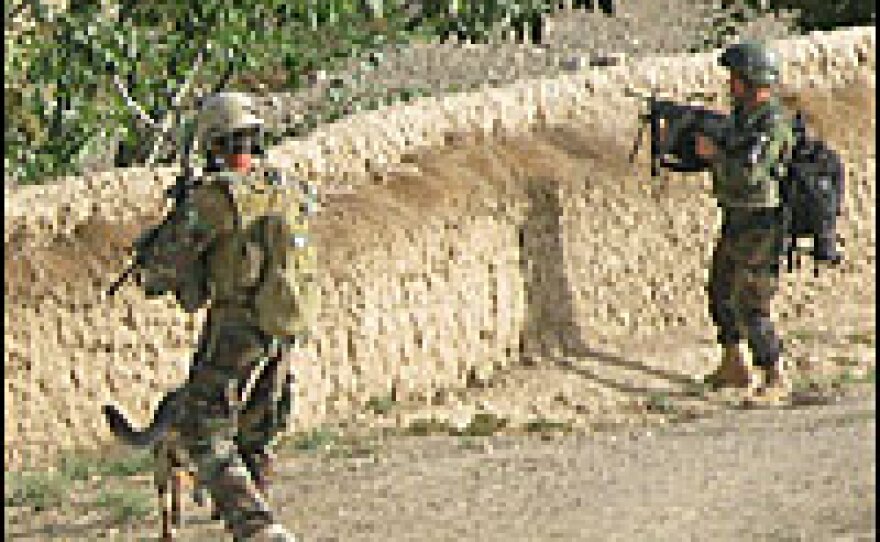
U.S. Special Forces in Afghanistan are involved in an ambitious project to turn thousands of Afghan soldiers into commandos. The effort to create an elite fighting force is part of the broader counterinsurgency strategy that U.S. military officials say is key in helping stabilize Afghanistan.
Special Forces, which have been constantly rotating through Afghanistan since they helped overthrow the Taliban in 2001, launched the commando program in the early spring of 2007.
Special Forces have a long history of training indigenous soldiers. The Afghans also had an interest in creating a special force within the Afghanistan National Army, says Col. Sean Mulholland, the commander of the Combined Joint Special Operations Task Force in Afghanistan, known by the acronym CJSOTF-A.
Developing A Flexible Force
"A couple of years ago, the Afghan government wanted to develop a Ranger-like or a Special Operations-like structure in the military," Mulholland says. "The ANA were large and laborious. The ANA is a good army, it's a developing army, but they need a smaller, more agile, flexible force. And so the commandos [were] the solution."
The initial commando training takes place in a remote military base in eastern Afghanistan called Camp Morehead, named after Special Forces Master Sgt. Kevin Morehead, who was killed in Iraq in 2003. The base has been used by forces of the various regimes that have ruled Afghanistan in recent history, including the Russians and the Taliban.
Now, American Humvees and Ford Ranger trucks are parked outside one-story plywood classrooms. Inside, commando recruits are trained in specialty platoons including reconnaissance, medics and signals.
"Signal is probably one of the most difficult things to teach [the Afghan recruits], and a lot of it goes back to previous education," says a trim 35-year-old Special Forces major who is the camp commander. Anyone of his rank or lower is not allowed to be identified to reporters for security reasons. "It's difficult to explain the background of how a radio works. So we try to cut a lot of theory out of it and just take it to practical application: This is how it works, and this is how you should make it work."
Nearly 40 percent of the soldiers entering the commando program are illiterate, but there are night school courses at the camp where future commandos can learn to read and write.
For the next few months, the commando training program in Afghanistan is being overseen by the 7th Special Forces Group out of Fort Bragg, with help from commandos from France and the United Arab Emirates.
'Lumps Of Clay'
The U.S. primarily advises, guides, organizes and oversees the camp, but much of the training in military strategy, tactics and skills falls to Afghan instructors, many of whom were originally trained in Jordan two years ago.
The recruits at the camp eat, sleep and live alongside each other for the rigorous 12-week course based on the Army Ranger battalion school in the U.S.
"Guys come in, and you got lumps of clay. They really don't know a lot about training and light infantry tactics," Mulholland says. "... It's kind of you tear them down and build them up again, it's the same thing. There's a lot of similarities between what we experience in Ranger school in the United States and what they're experiencing here in commando school."
Many of the Afghan soldiers show up with little more than the uniforms on their backs.
"We issue them uniforms, boots, helmets, weapons, vehicles, radios — everything that they're going to need," Mulholland says. The camp commander says when the commandos have finished their training and are attached to one of five regional ANA corps around the country, they are ready to go.
"They're fully equipped," Mulholland says. "All of this stuff here will all redeploy with them when they go." That includes the Humvees and other vehicles.
The Special Forces major agrees that the program costs a lot of money but says "you can't expect them to do the job we want them to do without having the right tools."
That job will include accompanying U.S. Special Forces on missions in some of the most remote and dangerous corners of Afghanistan. The new Afghan commandos will be trained to ambush or attack militant hideouts and bomb-making facilities, to capture or kill insurgents and to try to build rapport with people in villages where Islamist militants are present.
Battle-Hardened Commandos
So far, five Afghan commando battalions, known as Kandacks, have successfully passed through the gates of Camp Morehead. Each Kandack has 650 to 685 Afghan commandos from every region of the country.
Many are already battle-hardened by the time they join the training program.
Command Sgt. Maj. Faiz Mohammed is 27 and has been in the army for most of his adult life. He has been shot seven times in combat.
Mohammed is one of the commandos who has excelled in the program. Soon, he will be sent to the U.S. — first for English classes, then to Army Ranger School. Mohammed says he looks forward to the extra training as a way to improve the situation in Afghanistan.
"I want to change the old policy. I'll go to America. I'll learn special training and come back here, where I will teach my junior officers in the future," Mohammed says. "It will help change my country, my army — everything will be better."
'The Jewel Of The Army'
Col. Mohammed Fadeed Achmadi, the deputy commander of the Afghan commando brigade, was one of the first to graduate from Camp Morehead last year.
"Commando forces are, like we say, the jewel of the army," Achmadi says. "It's precious forces for the Afghan National Army. We have the best training, we have the best equipment, and we can conduct dangerous missions."
Once the Afghan commandos finish their initial training, they are sent on a joint mission with U.S. and other allied Special Forces. Then they're assigned to a battalion of the national army. Soon after, they rotate back into U.S. training camps for another six weeks to help expand and sharpen their skills.
U.S. trainers hesitate to compare the Afghan commandos with indigenous forces they've trained in other parts of the world.
"You have different cultural values, different cultural norms," says a U.S. Special Forces major and commander of an advanced operations base in the eastern city of Jalalabad. "I'd say the best way to describe them is they're steadfast in their improvement. They're dedicated. We really do see them as Afghani patriots, and I think the way ahead is pretty bright. Their heart is in the right place."
The Afghans express pride in what they're doing.
"We are here as a QRF — quick reaction force," says Capt. Hazarmee, who goes by a single name. He's commander of the second commando company at the Jalalabad base, which is being built up and will soon include dining and laundry facilities and more sleeping quarters.
"We are doing operations in four different provinces around here," Hazarmee says. "As soon as we get word that we're needed, we can get ready in 20 to 25 minutes and can stop any kind of bad activities."
Hazarmee indicates that he would like to see the Afghans build on their potential, such as building better local intelligence networks that could disrupt insurgent activity.
Invaluable Knowledge
Afghan commandos outnumber American and other Special Forces units on assault missions 4-to-1. A 29-year-old detachment commander at the Jalalabad base and a captain in the Green Berets says it's important to put an Afghan face on the missions. The Afghans have an inherent — and invaluable — knowledge of the terrain and the language.
"And I think that's why the commandos are so important," the captain says. "They are Afghans. They understand the country, they understand the history. They can interact with the population in a way that no outsider ever could."
The captain says the Afghans also understand local tactics.
If the Special Forces were looking for a weapons cache in a village, for example, "we may hide it in a wall or something in our own home back in the United States," the captain says. "The Afghans know they wouldn't hide it in their house — they'd keep it away, because we'd find it in their house. So they understand the customs, the way people actually do things, and it assists us in our planning."
Lt. Col. Chris Karsner, a Special Forces commander, says it's important that the Afghans play a major role in the struggle for stability in their country.
"Insurgency and counter-insurgency is an intimate struggle in the nation and, ultimately, it has to be an Afghan fight," Karsner says. It's the Afghan commandos, with their specialized training, who will be critical in the national effort to secure Afghanistan, he says.
It will be awhile, however, before the Afghan commandos will be able to operate without help, especially from Americans, Mulholland says.
"You need to feed them, you need to resupply them, you need to give them equipment, you need to give them mobility, cars, trucks, helicopters," Mulholland says. "There's a lot of pieces that we're missing there."
Somewhere down the line, it is hoped the Afghan commandos will be able to provide relief to U.S. Special Forces, which are feeling the strain from constant tours of duty in Afghanistan. But Mulholland predicts that the American elite fighting forces will be here for years to come, working side by side with the Afghan commandos.
Copyright 2022 NPR. To see more, visit https://www.npr.org. 9(MDAzMjM2NDYzMDEyMzc1Njk5NjAxNzY3OQ001))







